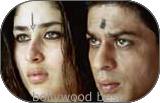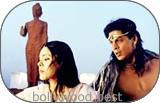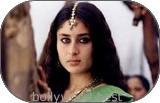|
 Cast:
Shah Rukh Khan, Kareena Kapoor, Danny Denzongpa, Ajit
Kumar, Hrishitaa Bhatt, Rahul Dev, Suraj Balaje, Subhashini,
Gerson da Cunha Cast:
Shah Rukh Khan, Kareena Kapoor, Danny Denzongpa, Ajit
Kumar, Hrishitaa Bhatt, Rahul Dev, Suraj Balaje, Subhashini,
Gerson da Cunha
Director: Santhosh Sivan
Music Director: Anu Malik, Sandeep Chowta &
Rajit Barot
Dialogues: Abbas Tyrewala
Santosh sivan's celluloid dream of recreating Asoka
fades away. Purporting to be a 'period film', Asoka
is out and out commercial made in the Bollywood genre.
Therefore, it is a glossy reconstruction of the monarch.
 The
film attempts to follow the journey of Asoka from "monarch
to monk"(though there is no evidence he become
a monk) as is outlined in the beginning. Fiction and
legend take over facts in this cinematic depiction.
The romantic angle predominates. The Kaurwaki legend
is actually built up into the whole film superceding
all the other essential elements. The
film attempts to follow the journey of Asoka from "monarch
to monk"(though there is no evidence he become
a monk) as is outlined in the beginning. Fiction and
legend take over facts in this cinematic depiction.
The romantic angle predominates. The Kaurwaki legend
is actually built up into the whole film superceding
all the other essential elements.
The early part of Asoka's life itself is shrouded in
darkness. The struggle for the throne between Asoka
(Shah Rukh Khan) and his stepbrother Sushema, his father
Bindusara's favourite (Ajith Kumar) and the subsequent
interregnum before Ashoka's coronation is a sketchy
and ambiguous narration.
 During
the course of his travels in the film, Asoka sees Kaurwaki
(Kareena) bathing (typically filmi). Asoka is immediately
smitten. So what the audience gets to see is the duo
breaking into song and dance in true Bollywood style.
This romance takes up a large part of the movie and
at times one felt that Kareena takes up more of screen
time than Shah Rukh, at least initially. Later she appears,
'dies' and reappears. During
the course of his travels in the film, Asoka sees Kaurwaki
(Kareena) bathing (typically filmi). Asoka is immediately
smitten. So what the audience gets to see is the duo
breaking into song and dance in true Bollywood style.
This romance takes up a large part of the movie and
at times one felt that Kareena takes up more of screen
time than Shah Rukh, at least initially. Later she appears,
'dies' and reappears.
 The
narrative is rather nebulous. The story becomes serious
when it deals with Asoka's conquests. The battle of
Kalinga and Asoka's subsequent transformation from Chanda
Asoka to Dhamma Asoka takes up the rest of the movie
with a bit on Devi of Vidisa (Hrishitaa Bhatt) woven
in. The film, thankfully, does not lay claim to historic
authenticity. It is not a historical reconstruction
of the king, only a passionate love story with elements
of history. Asoka's marriage to Devi is portrayed, which
according to historical sources, did not take place.
The transformation of Asoka after the battle could have
been more powerful. The
narrative is rather nebulous. The story becomes serious
when it deals with Asoka's conquests. The battle of
Kalinga and Asoka's subsequent transformation from Chanda
Asoka to Dhamma Asoka takes up the rest of the movie
with a bit on Devi of Vidisa (Hrishitaa Bhatt) woven
in. The film, thankfully, does not lay claim to historic
authenticity. It is not a historical reconstruction
of the king, only a passionate love story with elements
of history. Asoka's marriage to Devi is portrayed, which
according to historical sources, did not take place.
The transformation of Asoka after the battle could have
been more powerful.
 If
Sivan's intention was to recreate the emperor, he falls
short of it. Inconsistencies in the script mar the narrative
and what is finally dished out is a 'contemporary' perspective
of Asoka. Some crude and inane humour and even a raunchy
dance by Rajyalakshmi is inserted unnecessarily. What
the monarch was known for (the policy of dhamma) which
should have been given prominence is relegated to a
few lines at the end of the film. If
Sivan's intention was to recreate the emperor, he falls
short of it. Inconsistencies in the script mar the narrative
and what is finally dished out is a 'contemporary' perspective
of Asoka. Some crude and inane humour and even a raunchy
dance by Rajyalakshmi is inserted unnecessarily. What
the monarch was known for (the policy of dhamma) which
should have been given prominence is relegated to a
few lines at the end of the film.
The film is visually good - particularly some scenes
- outdoor locales and the war and 'kalaripayattu' but
the cinematography is not as stunning as in Sivan's
Terrorist or his other efforts. Costumes were too contemporary
in some scenes. (Imagine a heroine playing a 3rd century
B.C. character gyrating in a Manish Malhotra outfit).
 The
major plus point is Shah Rukh's portrayal. A rather
subdued and mellowed Shah Rukh ably depicts the various
emotions required of him. None of his usual histrionics
but he is able to give a controlled performance. That
is the image, which lingers on at the end. What is intriguing
is Asoka bleeding from the nose everytime he is emotionally
upset. (Wonder why?) Kareena looks and plays the sensuous
girl she is. The chemistry between the two is good.
Rahul Dev and Ajit surprise with their performances.
After Shah Rukh, the little boy who plays the role of
Arya (Prince of Kalinga and Kaurwaki's brother) gives
an endearing performance. The
major plus point is Shah Rukh's portrayal. A rather
subdued and mellowed Shah Rukh ably depicts the various
emotions required of him. None of his usual histrionics
but he is able to give a controlled performance. That
is the image, which lingers on at the end. What is intriguing
is Asoka bleeding from the nose everytime he is emotionally
upset. (Wonder why?) Kareena looks and plays the sensuous
girl she is. The chemistry between the two is good.
Rahul Dev and Ajit surprise with their performances.
After Shah Rukh, the little boy who plays the role of
Arya (Prince of Kalinga and Kaurwaki's brother) gives
an endearing performance.
 The
magnum opus of Sivan is rather disappointing considering
the hype. He could have stuck to the period aspect and
certainly made itt better with more substance. The true
picture of Asoka as a monarch fails to emerge. By the
way Asoka is certainly not written with a horizontal
diacritic mark over s. It could have been spelt as Asoka
rather than a transliterated Asoka with a wrong diacritic. The
magnum opus of Sivan is rather disappointing considering
the hype. He could have stuck to the period aspect and
certainly made itt better with more substance. The true
picture of Asoka as a monarch fails to emerge. By the
way Asoka is certainly not written with a horizontal
diacritic mark over s. It could have been spelt as Asoka
rather than a transliterated Asoka with a wrong diacritic.
Courtesy:
The Hindu
|



